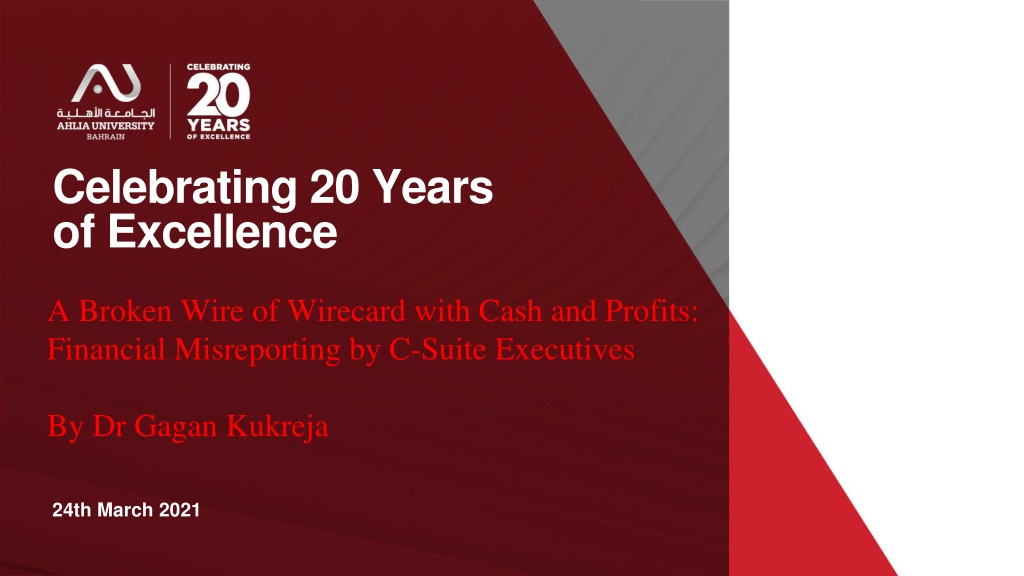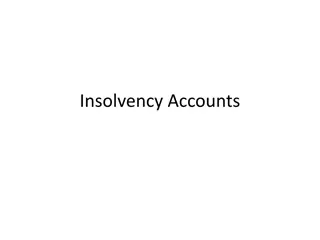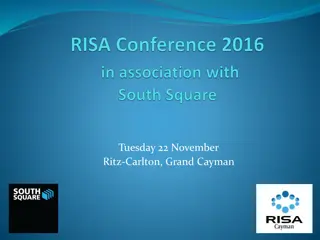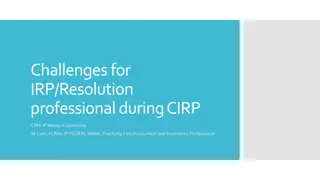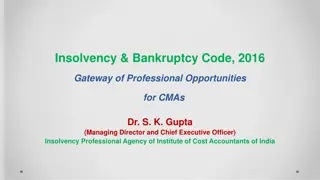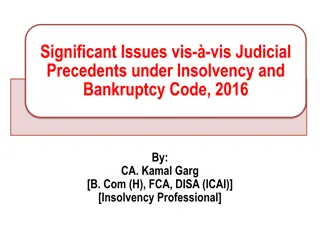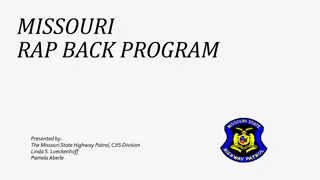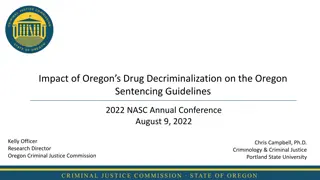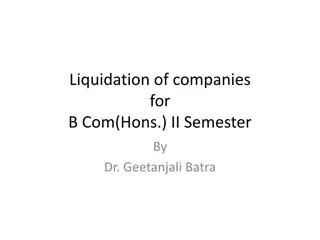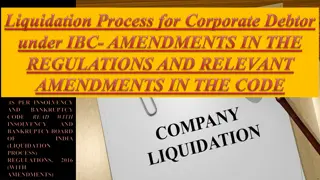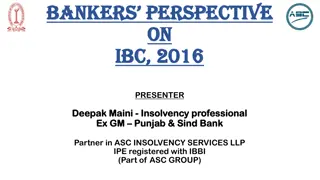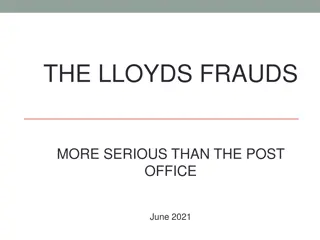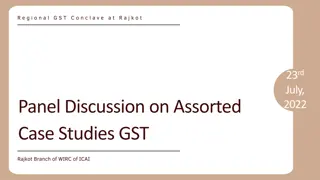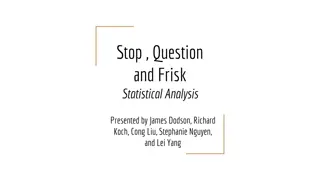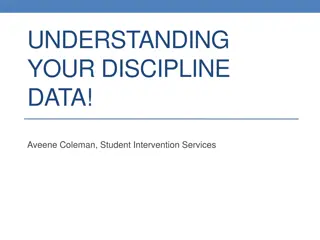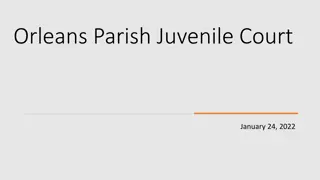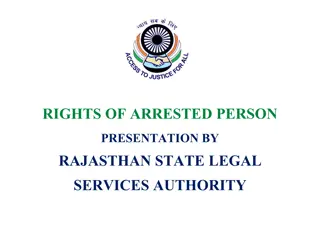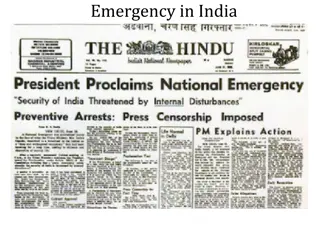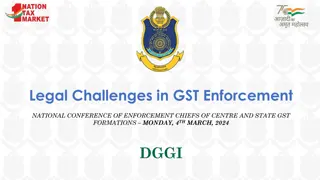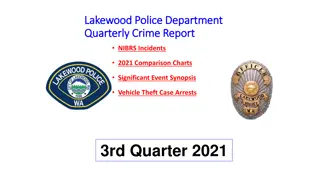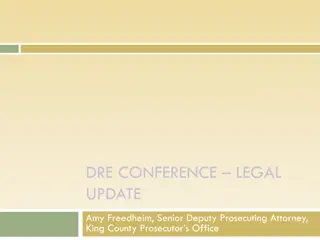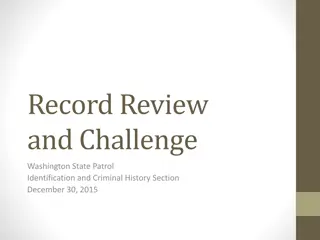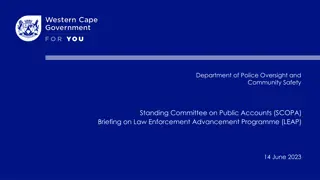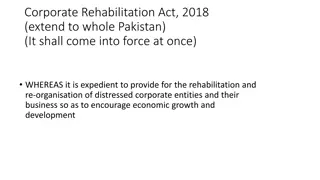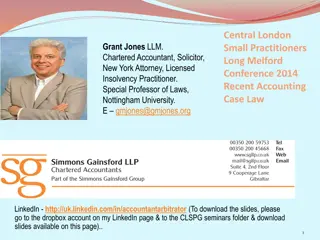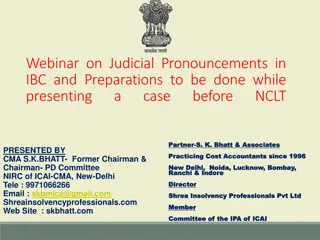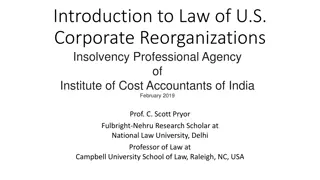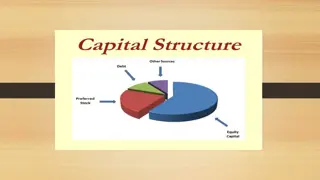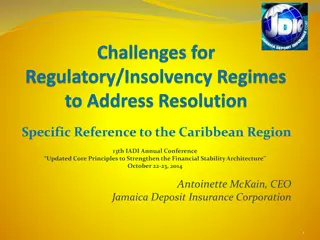The Wirecard Scandal: Misreporting, Arrests, and Insolvency
Wirecard, a once prominent German technology company, faced a scandal involving financial misreporting, resulting in arrests of top executives and eventual insolvency. Allegations of money laundering surfaced in 2016, leading to investigations and whistleblower reports. In 2020, the company's inability to verify profits and missing funds led to its insolvency filing. Key figures like Markus Braun and Jan Marselak faced legal repercussions, while regulators and auditors are under scrutiny for oversight failures.
Download Presentation

Please find below an Image/Link to download the presentation.
The content on the website is provided AS IS for your information and personal use only. It may not be sold, licensed, or shared on other websites without obtaining consent from the author. Download presentation by click this link. If you encounter any issues during the download, it is possible that the publisher has removed the file from their server.
E N D
Presentation Transcript
Celebrating 20 Years of Excellence A Broken Wire of Wirecard with Cash and Profits: Financial Misreporting by C-Suite Executives By Dr Gagan Kukreja 24th March 2021
Overview of Wirecard Wirecard AG, founded in 1999, is a technology based German public company with its operations in 26 countries. Markus Braun worked as Chief Executive Officer and Jan Marsalek as Chief Operating Officer. It provided electronic payment processing, banking solutions, card issuance, mobile payment and a plethora of risk management products and services to over 300,000 companies across the globe. Wirecard was a part of the top 30 valuable companies on the DAX-which is Germany s stock market index. 2
How the Scandal Unfolded! In 2016, a group of anonymous short sellers published allegations of money laundering against the company. However, German regulator BaFin found nothing suspicious in the investigations it carried out against Wirecard in the same year. In 2017 Ernst & Young gave a clean chit to Wirecard when it examined reports by companies who were receiving spear-phishing emails when they studied Wirecard. In April 2018, some internal investigations started in the Singapore office when an internal whistleblower alleged that the company was undertaking "round-tripping . Financial Times went ahead with a public investigation in January 2019. It unearthed for the first time in April 2019 improper accounting conduct of the company in Asia and the Middle East. 3
How the Scandal Unfolded! (Contd.) Report published by KPMG in April 2020 also stated that it could not verify a significant share of profits that were reported by the company from 2016 to 2018. In June 2020, two banks from the Philippines informed EY that the documents containing the details of the 1.9bn balances were not existing. On June 22, 2020 Wirecard announces that 1.9bn funds were not traceable and probably did not exist. On June 25, 2020 long term indebtedness forced Wirecard to file for insolvency. 4
Current Scenario Markus Braun, was arrested first in June & again in July 2020 on charges of inflating company value, falsifying company financial records. Jan Marselak is still missing and is suspected to be hiding in Russia. He has been added to Interpol s most wanted list. Bank of Philippines and the BDO Unibank, who had not accepted the claims of being a party to the missing 1.9bn, are under scrutiny The role of BaFin, the German regulator is also being questioned. EY faces lawsuits for its inability to catch the improprieties earlier. 5
Timeline Dates Major Events The Wirecard was incepted in Aschheim, DE, Germany. The company aimed to help websites in collecting credit card payments from customers. January 1, 1999 January 2002 Markus Braun, an ex-KPMG, was appointed as CEO. He initiated the merger of Wirecard with arch-rival Electronic Business Systems. October 26, 2005 Wirecard made an entry in the Frankfurt stock market and acquired the listed defunct call center group to refrain from the scrutiny of an initial public offering. It had 323 employees, and its main business included managing payments for online gambling and pornography. September 8, 2005 Wirecard bought XCOM and marked its presence in the banking sector. The Wirecard Bank was licensed by Visa and Mastercard, which entitled it to issue credit cards as well as manage cash for merchants. 2008 This year was the first time an allegation made on the company. The head of a German shareholder association pointed out discrepancies in its balance sheet. Ernst & Young carried out an audit. Two people who had not revealed their positions in Wirecard faced legal proceedings. February 1, 2010 Jan Marsalek, who had been groomed under Markus Braun was appointed chief operating officer. He was allegedly appointed so that operations of the company would be carried out using English as a medium of communication. It was an attempt at the company's presence in the international markets. 2011-2014 Wirecard raised 500m from its shareholders. Several abnormal deals to purchase companies struck in the Asian subcontinent. Singapore was its hub in this region. Spiral growth and the company's claims of using the latest technology for initiating payments lured investors. 6
Timeline (Contd.) October 2015 Wirecard announced its most significant deal of taking over Indian payments businesses in a whopping 340m deal. The Financial Times started reporting 250m misreporting in its balance sheet. A report from J Capital research pointed out that the contracts signed by Wirecard in the Asian markets were much smaller than reported. March 15, 2016 Wirecard accused of money laundering under a banner called Zatarra. The BaFin started its investigation. Wirecard announces that it was procuring a prepaid payment card business from Citigroup, making its entry in North America. 2017 EY gave an unmodified audit report, which increased cash investments and the stock prices almost doubled. A deal to take over payment processing operations from Citi Group across 11 major countries in Asia announced. March 2018 In March 2018, an internal legal team in Singapore launched an inquiry after a whistleblower gave information about the company's plan to send money to India under a scheme called "round tripping. August 2018 In August 2018, the share price of Wirecard skyrocketed to 191, valuing it at more than 24bn. Wirecard replaces Commerzbank in the prestigious Dax 30 index. April 24, 2019 SoftBank pumped in a 900m investment to Wirecard, which showed the confidence of a large Japanese firm in Wirecard. Documents published by Finacial Times showed that profits at Wirecard units in Dubai and Dublin were misappropriated, and that customers mentioned in documents provided to EY were false. In order to clear the doubts in the minds of its investors it appoints KPMG to audit the company. 7
Timeline (Contd.) April 2020 EY could not receive documents from a trustee residing in the Philippines that state that 1.9bn are supposedly in accounts of two banks there. KPMG's report is published, and it stated that due to severe hindrances during an audit it was unable to prove the reason for the massive profit made by the company from 2016-18. June 5, 2020 A criminal investigation filed against Markus Braun and three executive board members. On the complaint filed by BaFin, police raid the company's office. False reporting of statements just before the publication of the KPMG report is the reason cited as reasons for the complaints. June 8, 2020 EY was unable to establish the truth about 1.9bn cash reserves lying in trust accounts in two banks in the Philippines. Also, CEO Braun reduces his stake in Wirecard from 8.04% to 4.94%. June 2020 16-23, Two Documents containing the details of the 1.9bn balances were suspicious. On June 22, the Wirecard announces that 1.9bn funds were not traceable and probably did not exist. James Freis appointed as COO. CEO Markus Braun resigned. James Fries appointed as CEO on June 19, 2020. The Bank of Philippines and the BDO Unibank stated the missing 1.9bn never existed and accused the Wirecard of providing forged documents. It alleged that Wirecard was not its client. Jan Marsalek, COO, was fired. Markus Braun kept behind bars. The charges imposed against him were of manipulating the market and questionable accounting practices. Later, he was released on a bail of 5m. banks from the Philippines informed EY that the June 25, 2020 Long term indebtedness forced Wirecard to file for insolvency. In the history of DAX listed companies, Wirecard become the first defunct company. 8
Timeline (Contd.) July 28, 2020 Ex-CEO, Markus Braun, rearrested on charges of inflating company value, falsifying company financial records. Two other executives were also arrested Jan Marselak is still missing and is suspectd to be hiding in Russia. He has been added to Interpol s most wanted list. August 20, 2020 Effective from August 24, 2020 Wirecard AG will be deleted from the DAX index, Germany s flagship stock market index. August 21, 2020 An agreement has been reached to sell Wirecard s Brazilian business to Sao Paulo-based PagSeguro Digital, which is one of Brazil s largest mobile payment-based E-Commerce companies. Selling of a part of the company s operations in Britain and North America is also expected to be announced soon. Sale of Wirecard Card Solutions to Railsbank Technology Ltd. is also on the cards. 9
Timeline (Contd.) Sibs, a payment processing firm n Portugal has acquired Wirecard s operations in Romania. September 29, 2020 Banco Santander has acquired technology assets from the European merchant payments business from Wirecard. November 17, 2020 January 29, 2021 Head of Germany s financial regulator Bafin, Felix Hufeld has been relieved of his job as a result of grevious handling of the Wirecard fiasco. Bafin filed a criminal complaint against an employee on suspicion of insider trading. The employee, working in BaFin s Securities Supervision Sector, had sold structured products with Wirecard AG shares as the underlying on June 17, 2020. February 11, 2021 A German court has ordered the auditors of EY to testify their accounting work for Wirecard 10
Learning Objectives After going through from the case, the students would be able to: Understand the departure of material misstatement from earnings management; Identify the related party transactions and its importance in true and fair financial reporting; Detect and explain the signals that could have alerted for the absence of cash and related audit procedures. Assess and appraise the importance and role of audit procedures in unearthing the malpractices in financial reporting. This case can be used in Principle of Auditing class at the undergraduate program in the audit procedures topic. 11
Case Questions Critically assess the quality of earnings of Wirecard with the help of the last five years financial statements. Is there reason to believe that Wirecard's financial statements lack credibility? How is earnings management different from material misstatement? Was Wirecard involved with either? Critically evaluate the role of related party transactions in terms of round-tripping and roll-up. What kind of audit procedures can be employed to detect such ill will accounting practices? Identify the weakness of audit procedures performed by EY. Why did the red flags ignore? What is the role of EY when KPMG gave disclaimer on the special audit of Wirecard? What was the auditors' responsibility while they were conducting the audit of Wirecard? How can the auditors prevent and detect such kind of accounting irregularities? What kind of oversight mechanism can be proposed? 12
